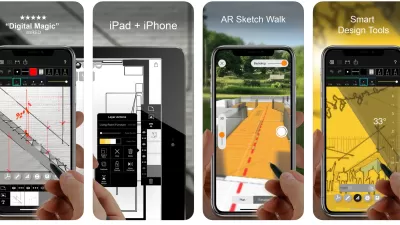Some of the most popular apps - from Google Maps to Yelp - let you take the guesswork out of planning your urban agenda. But for those that still want to experience the delight of spontaneous discovery, a new generation of app will help you get lost.
It seems an odd commentary on our time that we would pine for the unpredictable, and even inconvenient. But, "[e]asy access to vast quantities of information has increased the value of the unknown, and technology is emerging to meet this need," says Anja Wolf, who points to several apps that facilitate the kind of unexpectedly rewarding wandering that seems inceasingly difficult to undertake.
"AWOL, for example, is a package of algorithmically generated routes that help people get lost in cities. It even includes a nonworking compass. There is also the web service GetLostBot, which tracks the places you visit over time and offers alternatives when they become too repetitive. As for apps, Drift facilitates getting lost in familiar places, and Serendipitor helps with finding things by looking for something else."
"Perhaps we're beginning to see our cities with new eyes, as full of potential for aimless treasure hunting with or without the help of technology," writes Wolf. "There remains so much we don't know about the places where we live, so much to discover. Moving outside our comfort zones and forgetting what we're looking for may help us find new pleasure in city living."
FULL STORY: Learning to Get Lost in Cities

Maui's Vacation Rental Debate Turns Ugly
Verbal attacks, misinformation campaigns and fistfights plague a high-stakes debate to convert thousands of vacation rentals into long-term housing.

Planetizen Federal Action Tracker
A weekly monitor of how Trump’s orders and actions are impacting planners and planning in America.

In Urban Planning, AI Prompting Could be the New Design Thinking
Creativity has long been key to great urban design. What if we see AI as our new creative partner?

King County Supportive Housing Program Offers Hope for Unhoused Residents
The county is taking a ‘Housing First’ approach that prioritizes getting people into housing, then offering wraparound supportive services.

Researchers Use AI to Get Clearer Picture of US Housing
Analysts are using artificial intelligence to supercharge their research by allowing them to comb through data faster. Though these AI tools can be error prone, they save time and housing researchers are optimistic about the future.

Making Shared Micromobility More Inclusive
Cities and shared mobility system operators can do more to include people with disabilities in planning and operations, per a new report.
Urban Design for Planners 1: Software Tools
This six-course series explores essential urban design concepts using open source software and equips planners with the tools they need to participate fully in the urban design process.
Planning for Universal Design
Learn the tools for implementing Universal Design in planning regulations.
planning NEXT
Appalachian Highlands Housing Partners
Mpact (founded as Rail~Volution)
City of Camden Redevelopment Agency
City of Astoria
City of Portland
City of Laramie




























